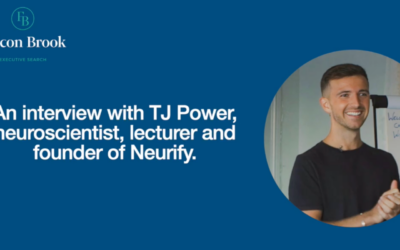The role of business and leadership in promoting mental health in the workplace has come under the microscope as the mental health impact on employee and business performance is acknowledged.
Far-reaching diversity, equity and inclusion programmes have helped to transform once “toxic” workplaces by defining clear policies and values for employee behaviour and encouraging respect so people can be themselves at work.
‘Inclusive leadership’, ‘vulnerable leadership’ and ‘empathetic leadership’ have provided new frameworks so senior teams can create workplaces where people feel more comfortable and content.
“People are generally drawn to leaders who share their personal challenges. It creates a safe space where people feel they can talk about mental health issues and also get and give advice on how they can get help,” said Penny Delve, Head of Growth at Falcon Brook Search. She brings 20 years’ experience in recruitment and is a trained coach.
“A leader’s responsibility is creating that safe space where people can talk about what might be getting in their way. It’s not their responsibility to solve the problem. You can’t expect leaders to manage depression. Someone having a miserable day and feeling a bit low is different from someone who is consistently having a problem. Sometimes a person just needs to be heard.”
Facilitating access to a GP either in-house or close by, either as a benefit or as a subsidised service, can enable employees with clinical issues to access support.
A challenge for high performers and high performing teams, where stress is part of the job, is that they may think that keeping going is part of the requirement and that speaking out could be seen as weakness leading to stigma.
The reality is generally very far from the truth.
Chantel’s experience is that both clients and candidates are often more willing to be open with her and her consultant team because of the sincerity in their approach and genuine interest in wellbeing.
“My relationship with my network has always been based on authenticity and honesty, and I hope my contacts have always felt that I care and have been able to trust me. That connection around personal wellbeing is now the backbone of Falcon Brooks values.
“I see how an empathetic and nurturing leadership style helps to create a safe space. I’ve had people in tears unburdening themselves because of stress at work. I see it as part of our job to support our client and candidate network, especially if they feel they can’t be open at work.”
Men in her business have the same effect because they share the same values, and as a result, they build more open relationships with clients and candidates that often surprise both parties.
“The key is that we really listen,” Chantel continued. “We are genuinely interested in the person in front of us. We all focus on the human being and believe our success shows this open approach and investment into mental health works. It’s about bringing businesses back to basics. Mental health directly correlates to the business success and shows on the P&L.”
Facilitating dialogue is increasingly part of the search consultant role: “We help people start a conversation within a team and this can have a transformative effect,” Chantel said. “Often they realise the support was there all the time, they just didn’t see or believe it.”
“We need to normalise those conversations,” Penny continued. “There can’t just be values on a wall or seminars once a year. Leaders need to lead by example. If possible, they have to be seen to be getting help themselves. When leaders kick off the conversations people will follow. It’s easy to make damaging, off the cuff comments accidentally. Even something as simple as ‘everything is blamed on poor mental health these days’ can lead people to think they need to be on their guard. Employees need to know it’s ok to be vulnerable.”
Louise Pollock, economist and behavioural neuroscientist, suggests behaviour and culture are the starting points for being able to support employees and their mental health.
Louise believes businesses need to have clear values that are ‘lived’ consistently by all. “There is little point in fancy team-building events like falling off logs or making ice-cream together if, when you return to work the agreed behaviour is not evident in decision making and ways of working together day-to-day.”
A real complication in the discussion of occupational mental health is lack of clarity about what ‘mental health’ really means or includes.
“Businesses need to define what they mean by mental health and wellbeing, otherwise attempts to provide support can be more confusing than helpful,” Louise said.
For some, mental health is about trying to ensure employees are ‘happy’, for others it is about recognising when an employee may not be neuro-typical, for example, if an employee is on the autistic spectrum, and may need additional support, while others feel the need to provide support for acute ill-health concerns.
Introducing mental health and wellbeing plans without understanding and agreeing the problems the business is trying to solve could make the situation worse and businesses and line managers can end up dealing with situations that really should be managed clinically.
“Business owners cannot be expected to be mental health experts who know how to provide support to everyone,” Louise notes. “Someone who only seems quiet or lonely at work may be masking serious mental health problems. Alternatively, someone whose behaviour is unexpected or unexplained may benefit from an empathetic listening ear.”
Corporate leaders and line managers are rarely trained to deal with understanding the different levels of support which may be required, or to recognise when the situation is worse than it first appears.
Louise continues, “There are a number of complicated aspects of businesses becoming involved in mental health issues. For example, when businesses become involved in mental health concerns, conflicts of interest can arise.
“Whether support is being given internally, or through an external coach, clear boundaries need to be understood about the types of information which an employee may share which would trigger a discussion about a potential clinical referral, and how that process would work. Providing support in the workplace can also lead some individuals to feel insecure and worry that their own continued employment may depend on them reaching a specific mental health outcome.”
Louise advises businesses that want to encourage people to feel happy at work to recognise that people often feel satisfied and ‘happy’ when they feel they have really achieved something. This can mean getting through a challenging situation, recovering from getting things wrong, or being out of your comfort zone.
“If employers focus on eliminating these events, they potentially take away the opportunity for real satisfaction, and indeed, learning,” Louise continues. “If the culture and behaviour of the organisation is defined and genuinely ‘lived’ by all and employees are given the tools and support to handle difficult situations in a constructive way, employers should be able to take some comfort from the reality that it really is impossible to make someone else happy. That’s something people must take responsibility for themselves.”
Penny Delve agrees employees have a role to play in building their resilience. “The more you work on yourself the more you can give to others as well. It infiltrates everything that you do. There needs to be education about it not being entirely the responsibility of the leader. Leaders can’t solve the problem – but they can direct employees to the right place and empower people to get help.”
“Hybrid working works well,” said Penny. “Some personalities do work better at home but most of us value connection. Being in the office even just once a week means you can create those connections and feel that energy.”
Spotting the employee who may be feeling isolated and then addressing their needs can be difficult.
“It’s much more challenging to stay in touch with people,” Penny continued.
She advises leaders to ask different types of questions and to find time around virtual calls and meetings to talk to people as individuals.
“It’s not enough to ask ‘are you ok’. Try an open question such as ‘How can I support you’ or ‘What else can I be doing’ or ‘What do you need right now?” These are very simple questions with powerful answers when you take time to ask them. It’s about small shifts. More than ever, we need to chat about people’s lives.”
Another consideration is the return to the office, which may feel scary for some.
“Leaders need to explain why people need to come in and make it sociable,” advises Penny. “If employees know that it’s ok to be frightened and that everyone feels a little worried about coming together again then it starts to recreate that connection and foster safe feelings.”
“If people can be 100% themselves that is the starting point,” Penny concluded. “Best practice is a leader that has had some training in a business where there is a clear process to follow so they know what options they can offer employees.”
“There is a lot of pressure being put on leaders to support and help people. Leaders need to listen, support, and help but they are not responsible for the mental health of an employee. That’s a responsibility that everyone needs to take for themselves.”



